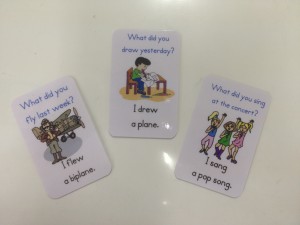curriculum EFL eikaiwa ES evaluation expectations kids language courses Language learning school management teaching testing theory university
by sendaiben
2 comments
English teachers aren’t really teachers, are they?
This is something I have been thinking about for a while now.
I was just drafting this post when I saw this link by Steve ‘the Linguist’ Kaufmann (NB: I started writing this post three months ago).
I’m not sure that we EFL teachers are actually teachers.
After all, we are in charge of helping learners become proficient in a language. I see this as a skill to be practiced rather than a set of knowledge to be taught. I have always compared language learning to sports, and described what learners should be doing in terms of practice and training. The sports analogy seems to work very well:
1. some people are naturally better at sports/languages than others
2. anyone can get better at sports /languages through practice
3. formally studying sports/languages is of limited use on its own, although it can help if done in conjunction with practice
4. being good at one sport/language will often help you with another one
5. if you want to get better at a sport/language, you should aim to do meaningful practice every day
6. training equipment will help you improve at a sport/language, but is no substitute for practice
7. drills can be helpful, but you also need to practice under realistic conditions if you want to get better at a sport/language
You can probably make similar analogies to playing a musical instrument, or producing art.
The point is, if we are coaches rather than teachers, don’t we need to re-examine our teaching situation?
Are formal classes, exams, class assignments, and grades appropriate ways to help our students master the skill of English language use (as opposed to the academic equivalent knowledge), or are they actually counter-productive?
Now, most of us are restrained by our work situations: we can’t abolish classes or grades, but perhaps there is some way we can change our classes to make them more practical. I’ll be thinking about that in the new academic year, starting in April here in Japan.
curriculum EFL expectations kids school management teaching theory
by sendaiben
leave a comment
An interview with Ken Robinson
A great interview with Ken Robinson.
curriculum EFL ES expectations kids online resources teaching TED theory very young learners
by sendaiben
4 comments
Self-control (don’t eat the marshmallow YET)
This is a great presentation. Not sure if I have posted it before, but it’s probably worth a few minutes of your time (love the videos of kids at the end).
curriculum EFL expectations extensive listening language courses Language learning listening teaching theory
by sendaiben
leave a comment
Listening and taking notes: harder than just listening?
I’ve been meaning to write something about this for a couple of weeks months now.
I started doing listening exercises this year in my university reading classes. Students listen to graded reader CDs as a class while taking notes, then talk in groups checking their understanding, and finally write a short summary of what they heard.
So far we’ve been doing short (two three minute) sections of level two reader CDs. These are texts that my students would be able to read easily, but they have trouble following it as audio. I presume this is because most high school students rarely if at all practice listening for more than a single sentence or short dialogue.
The feedback so far has been pretty good, with most students finding the practice interesting, challenging, and useful. They also appreciate the chance to practice listening, speaking, and writing in a short time.
However, there was one thing that came up that really surprised me. Many of the students have mentioned in feedback that they find it much harder to listen and take notes at the same time. I had assumed that taking notes would help them focus, but it seems that for a substantial minority this is not the case.
After receiving this feedback I allowed the students to take notes or not in the following class, and that seems to have solved the problem.
Does anyone have any similar experiences or articles/theories that address this? It was fairly counterintuitive to me, although I guess it makes sense that the increased mental load of having to filter the content to take notes would make it harder to actually process the language…
EFL eikaiwa ES kids language courses Language learning levity materials speaking teaching vocabulary
by sendaiben
6 comments
David Lisgo’s new card games
I am a big fan of David Lisgo‘s work, especially the Switchit card game.
Recently he has made a new set of card games based on verbs. Unlike Switchit, which is similar to UNO, these are more like a combination of Go Fish and Happy Families or Rummy.
Play is simple: players are dealt a number of cards and they try to collect sets of four by asking other players: if the other player has the cards, they hand them over; if not, the asking player takes a card from the middle (like Go Fish). Play continues until all the cards are gone or the time is up.
One caveat is that the game if played in full can take a long time: I have found setting a time limit or removing cards or sets from the deck helps speed things up.
Our students enjoyed the new game and I liked it very much as well. Students are talking a lot more, using full sentences, and getting a lot of practice with verb forms. These cards are a great addition to a teacher’s toolbox.


